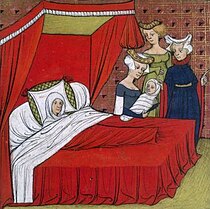
Back حبس الولادة Arabic Có̤ nguŏk-lê CDO Ծոյեծը Armenian Kurungan pascapersalinan ID 産後の肥立ち Japanese 산후격리 Korean Fifanana Malagasy Цзоюэцзы Russian 坐月子 Chinese Chò-goe̍h-lāi ZH-MIN-NAN

Postpartum confinement is a traditional practice following childbirth.[1] Those who follow these customs typically begin immediately after the birth, and the seclusion or special treatment lasts for a culturally variable length: typically for one month or 30 days,[2] 26 days, up to 40 days, two months, or 100 days.[3] [4] This postnatal recuperation can include care practices in regards of "traditional health beliefs, taboos, rituals, and proscriptions."[5] The practice used to be known as "lying-in", which, as the term suggests, centres on bed rest. In some cultures, it may be connected to taboos concerning impurity after childbirth.
- ^ Withers, M; Kharazmi, N; Lim, E (January 2018). "Traditional beliefs and practices in pregnancy, childbirth and postpartum: A review of the evidence from Asian countries". Midwifery. 56: 158–170. doi:10.1016/j.midw.2017.10.019. PMID 29132060.
- ^ Chien, Yeh-Chung; Huang, Ya-Jing; Hsu, Chun-Sen; Chao, Jane C-J; Liu, Jen-Fang (2008). "Effect of Alcohol consumption on Maternal lactation characteristics during 'doing-the-month' ritual". Public Health Nutrition. 12 (3): 382–388. doi:10.1017/S1368980008002152. PMID 18426631.
- ^ "Confinement practices: an overview". BabyCenter. Retrieved 2016-03-21.
- ^ "Chinese Postpartum Nannies".
- ^ Tung, Wei-Chen (22 June 2010). "Doing the Month and Asian Cultures: Implications for Health Care". Home Health Care Management & Practice. 22 (5): 369–371. CiteSeerX 10.1.1.1020.5139. doi:10.1177/1084822310367473. S2CID 73055081.